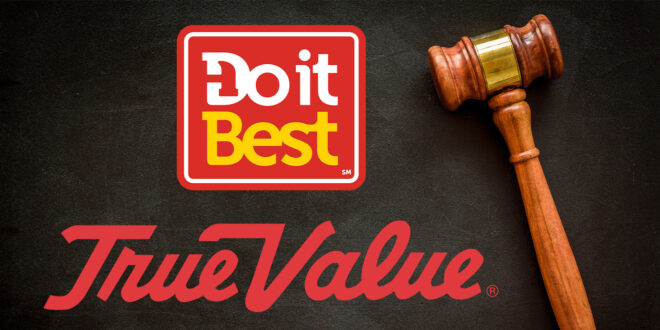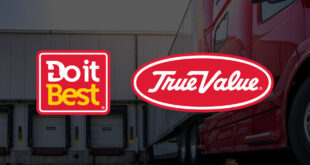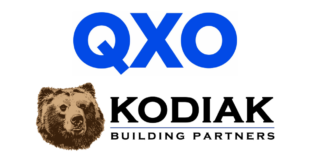True Value Company and its secured lenders, led by PNC, today reached a major milestone agreement to avoid the liquidation of the 75-year-old Chicago-based distributor in a move that will push the sale to Do it Best forward for now. The agreement allows True Value to continue to use the banks’ cash collateral to fund business operations through the closing of the sale, which, as part of the deal, was moved up by two weeks.
In the new agreement, the banks will now recoup $163.27 million of the $238 million they were owed when True Value filed for Chapter 11 Bankruptcy protection on Oct. 14. In the original budgets submitted by True Value’s financial advisers, the banks would have only recouped $135 million.
In his opening statement, True Value attorney Robert Drain from the New York-based law firm Skadden, Arps, Slate, Meagher and Flom LLP, says, “We are here with very good news, especially good news for (True Value) and all of its constituents. The debtors, the pre-petition secured lenders, the unsecured creditors are in agreement with the following terms, which would resolve the company’s request for use of cash collateral and frankly, we hope, provide a path forward for the resolution of this case.”
The first point in the agreement listed by Drain was that Do it Best will deliver the lenders a net payout of $163 million in cash.
“In the event the closing sale proceeds and the debtor’s cash on hand at the time of closing is insufficient to repay the group of pre-petition lenders the $163 million, then Do it Best will agree to backstop up to $10 million to ensure the bank group receives the $163 million,” he says.
Drain says if any portion of the $10 million is used, then Do it Best will receive a dollar-for-dollar reduction under the asset purchase agreement, under the assumption of up to $45 million of administration expense liabilities.
Do it Best also agreed to remove from the asset purchase agreement its inventory threshold/price adjustment, according to Drain.
“True Value will no longer be required to maintain a minimum level of inventory, and there will be no price adjustment on account of inventory levels at closing. This reflects the debtors’ and Do it Best’s comfort at this point that sufficient levels (of inventory) will be available, but it’s not a condition or affects the price in any way,” he clarified.
Part of what the banks were questioning was the burn rate of their cash collateral under the previous budget submitted by True Value, given the length of time the company would have to continue operations until the originally scheduled closing date. However, a new budget was submitted yesterday afternoon that accelerated the timeline of the sale to preserve the cash collateral, which increased the payback to the lenders by an additional $28.2 million.
Drain mentioned that moving forward, budget variances on disbursements will be permitted at 7.5% and will be tested weekly on a cumulative basis, provided there will be no variances on the professional fees set forth in the budget without the lender’s consent. This provides a bit of flexibility for True Value to meet its budget goals between now and the closing but does not offer the same flexibility in terms of any professional fees True Value might accrue during this time that would fall outside the budgeted amounts.
At the sale closing, after True Value funds any unfunded professional fee carve out amounts, in addition to the bank group’s $163 million payment, wind-down reserves and projected employee claims, any money in excess of the funded amounts will be distributed with 75% going to the banks and the remaining 25% to True Value for administrative claims reconciliation for a period of 90 days from the closing date.
“Following that 90-day period, any excess funds from the debtor’s 25% fund will be remitted to the bank group for application against the obligation,” Drain says.
In addition, the wind down reserve in the budget, which is to be funded upon the closing of the sale to Do it Best, has been reduced from the budgeted amount of $5.1 million to $3 million. Upon the closing of the Do it Best sale, the bank group will release its liens and super priority claims against the insiders of the True Value debtors.
Do it Best, which reportedly increased its offer by $2.7 million to help the sale move forward, agreed to all of these points, according to Drain, and will receive an administrative expense claim instead of a super priority claim for expense reimbursement, under its proposed purchase agreement.
The revised case documents, which are scheduled to be filed with the court tomorrow, will include a proposed final cash collateral plan and budget.
The schedule to closing the sale of True Value to Do it Best by Nov. 22 will now be as follows:
- The bidding procedures hearing will take place on Nov. 4
- The sale notice service deadline will be Nov. 6
- The bid deadline and sale objection deadline is set for Nov. 8
- The deadline for Do it Best to make written offers of employment to True Value employees is Nov. 15
- If there is a qualifying bid (other than the current bid by Do it Best), the auction would take place Nov. 11
- The sale hearing will be Nov. 12
- The cure objection deadline will be Nov. 18
- The contract designation deadline will be Nov. 20
- The new target closing date is Nov. 22
“I so very much appreciate the hard efforts for what has been happening over the past week…and the incredible amount of work and effort to resolve this matter for the thousands of stakeholders in this case,” says Karen Owens, who is the judge presiding over the case. “I will sleep much better tonight, and I know you will, too.”
Follow along with all of the True Value bankruptcy and sale news:
-
- True Value RDCs Prepare for Potential Shutdown
- Judge Shares Concerns With Direction of True Value Bankruptcy Filing
- Bankruptcy Judge Allows True Value to Use Cash Collateral While Lenders Push Back
- Industry Reacts to True Value Bankruptcy and Potential Sale to Do it Best
- NHPA Offers Tools, Reassurances to Retailers Potentially Impacted by True Value Bankruptcy
- Do it Best CEO Adds New Insights to True Value Purchase Plans
- True Value Files for Chapter 11 Bankruptcy, Do it Best Bids to Acquire Assets
 Hardware Retailing The Industry's Source for Insights and Information
Hardware Retailing The Industry's Source for Insights and Information








